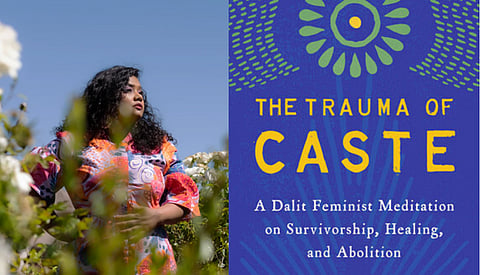'The Trauma Of Caste' Explores Dalit Oppression Through An Intersectional, Feminist Lens
Talking about the elephant in the room occupied by activism, representation and liberal standpoints, casteism is probably the only socio-political issue that remains grossly unaddressed in our progressive, post-modern era. A worrying majority of Indians believe that the 3000-year-old caste system doesn’t exist anymore. Partly because that would require us to check our own privilege and partly due to its origins which lie in the Hindu religious theory. Things always get messy when religion is involved.
The first step towards acknowledging the problem occurs with the ability to listen to the stories of those who have been and continue to be exploited by the system. Sharing her own experience as a Dalit woman, Thenmozhi Soundararajan a Dalit-American transmedia artist recently announced her book, 'The Trauma of Caste', which releases on November 15 this year. The book is described as a Dalit feminist meditation on survivorship, healing and abolition.
“I wrote this so that we would have a book that finally looked at a caste-centred society and how we might heal from this system of exclusion. It ties Dalit oppression to fights for liberation among Black, Indigenous, Latinx, Femme, and Queer communities, examining caste from a feminist, abolitionist, and Dalit Buddhist perspective; laying bare the grief, trauma, rage, and stolen futures of the caste-oppressed, enacted by Brahminical social structures,” shares Thenmozhi.
The author is a Dalit rights activist and actively campaigns for the rights of the marginalized in midst of structural casteism. She is also the co-founder and executive director of Equality labs, an Ambedkarite South Asian power-building organization that uses community research, political base-building, culture-shifting art, and digital security to end the oppression of caste apartheid, Islamophobia, white supremacy, and religious intolerance. Thenmozhi’s intersectional, cross-pollinating work helps to create a more generous, global, expansive and inclusive definition of South Asian identity along with safe spaces to honour the stories of these communities.
The divide between perceptions of caste in Savarnas (people who fall within the caste system of Brahmin, Kshatriya, Vaishya and Shudra) and Avarnas (people who weren't even given a place in the caste system) is a significant factor in the perpetration of this system. The former stay ignorant of their privileges and fail to identify the insidious dynamics of casteism because it doesn’t directly affect them, while the latter suffer in silence and are a victim of cultural gaslighting. Our polarised approach to the whole issue, where we either find reservation unfair on one end or let our saviour complex guide our intentions without understanding the background and consequences on the other, has kept us from making any progress.
The zone of real change lies in social responsibility and awareness; where the South Asian representation in the western art and music world isn’t saturated by savarna artists appropriating and fetishizing and aestheticizing the struggles of caste-oppressed communities, where participation in violent social hierarchies isn't further enforced by ignorance and unchecked privileges and where even religious institutions are held accountable.
Personal stories like The Trauma of Caste are also excellent agents of change; dissolving our bubbles that invalidate the real, traumatic experiences of marginalised communities. They open a portal into a world we thought didn’t even exist and help us change it.
You can preorder the book here.


